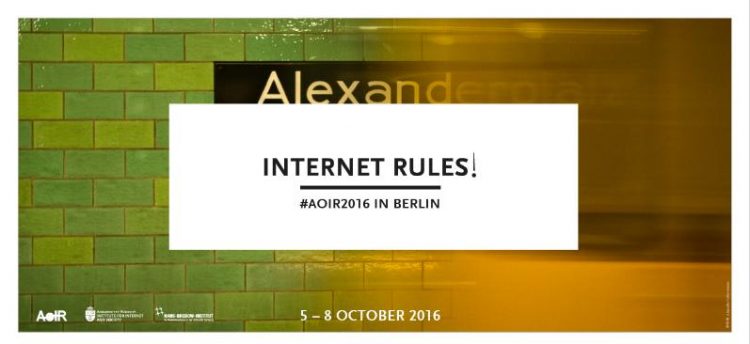INTERNET RULES! – Call for Papers for the AoIR Internet conference is open

Internetkonferenz AoIR 2016 in Berlin Foto: hiig.de, BY-SA 3.0 de
The 17th annual conference of the Association of Internet Researchers, a transdisciplinary Internet conference will take place at Humboldt-Universität zu Berlin, Germany on 5 – 8 October 2016.
You are cordially invited to submit your proposals for papers, panels, workshops, roundtables, and other experimental events for the AoIR 2016 via the AoIR website http://www.aoir.org. This year the Alexander von Humboldt Institute for Internet and Society and the Hans-Bredow-Institute for Media Research have been announced as conference hosts.
The conference will be opened by a Keynote speech by José van Dijck, president of the Royal Netherlands Academy of Arts and Sciences (KNAW) and former Dean of the University of Amsterdam. Her most significant publications include “Mediated Memory in the Digital Age” and “The Culture of Connectivity. A Critical History of Social Media”.
AoIR 2016 will emphasise the regulation of the Internet at various conceptual levels. The conference theme “Internet Rules!” addresses the significance of the codes and rules that frame the Internet, as well as their playful circumvention, from technical protocols and popular platforms to the emerging, established, and contested conventions of online communities.
Who are the actors in both the practices of rule-making and rule-breaking, what are their motivations and resources, and how can their power relations and communicative figurations be described? How does the Internet influence the proliferation of the values that its platforms, services and infrastructures embody, and what spaces of creative resistance persist? How do various forms of technical, social, and cultural hacking subvert these orders?
The committee extends a special invitation to junior researchers and practitioners, who have previously not participated in an Internet Research event to submit proposals.
Topics could include but are not limited to:
– coordination and rule-making online
– media, culture and identity
– (h)activism and social justice
– critical approaches to algorithms, platform studies
– codes and practices of Internet culture
– connected devices and the Internet of Things
– big data and predictive analytics
– techno-social interfaces
– digital labor, crowdsourcing and co-creation
– Internet governance and regulation
– (global) social media
– communication, participation and polarisation online
– philosophy of information and knowledge
Alexander von Humboldt Insitute for Internet and Society
The Alexander von Humboldt Institute for Internet and Society (HIIG) explores the dynamic relationship between the Internet and society, including the increasing interpenetration of digital infrastructures and various domains of everyday life. Its goal is to understand the interplay of social-cultural, legal, economic and technical norms in the process of digitisation.
Hans-Bredow-Institute
The research conducted by the Institute focuses on mediated public communication: today, the different types of mass media shape people's everyday life, politics, the economy as well as culture to a greater extent than ever before. Understanding the underlying determinants, assessing future opportunities and risks, and providing orientation for the actors involved – are the main focus of the Institute's research.
Press contact:
Alexander von Humboldt Insitute for Internet and Society
Jana Schudrowitz | Französische Straße 9 | 10117 Berlin | +49 30 209 334 90 | jana.schudrowitz@hiig.de
Hans-Bredow-Institute
Christiane Matzen | Rothenbaumchaussee 36 | 20148 Hamburg +49 40 45021741 | c.matzen@hans-bredow-institut.de
Media Contact
All latest news from the category: Event News
Newest articles

NASA: Mystery of life’s handedness deepens
The mystery of why life uses molecules with specific orientations has deepened with a NASA-funded discovery that RNA — a key molecule thought to have potentially held the instructions for…

What are the effects of historic lithium mining on water quality?
Study reveals low levels of common contaminants but high levels of other elements in waters associated with an abandoned lithium mine. Lithium ore and mining waste from a historic lithium…

Quantum-inspired design boosts efficiency of heat-to-electricity conversion
Rice engineers take unconventional route to improving thermophotovoltaic systems. Researchers at Rice University have found a new way to improve a key element of thermophotovoltaic (TPV) systems, which convert heat…



